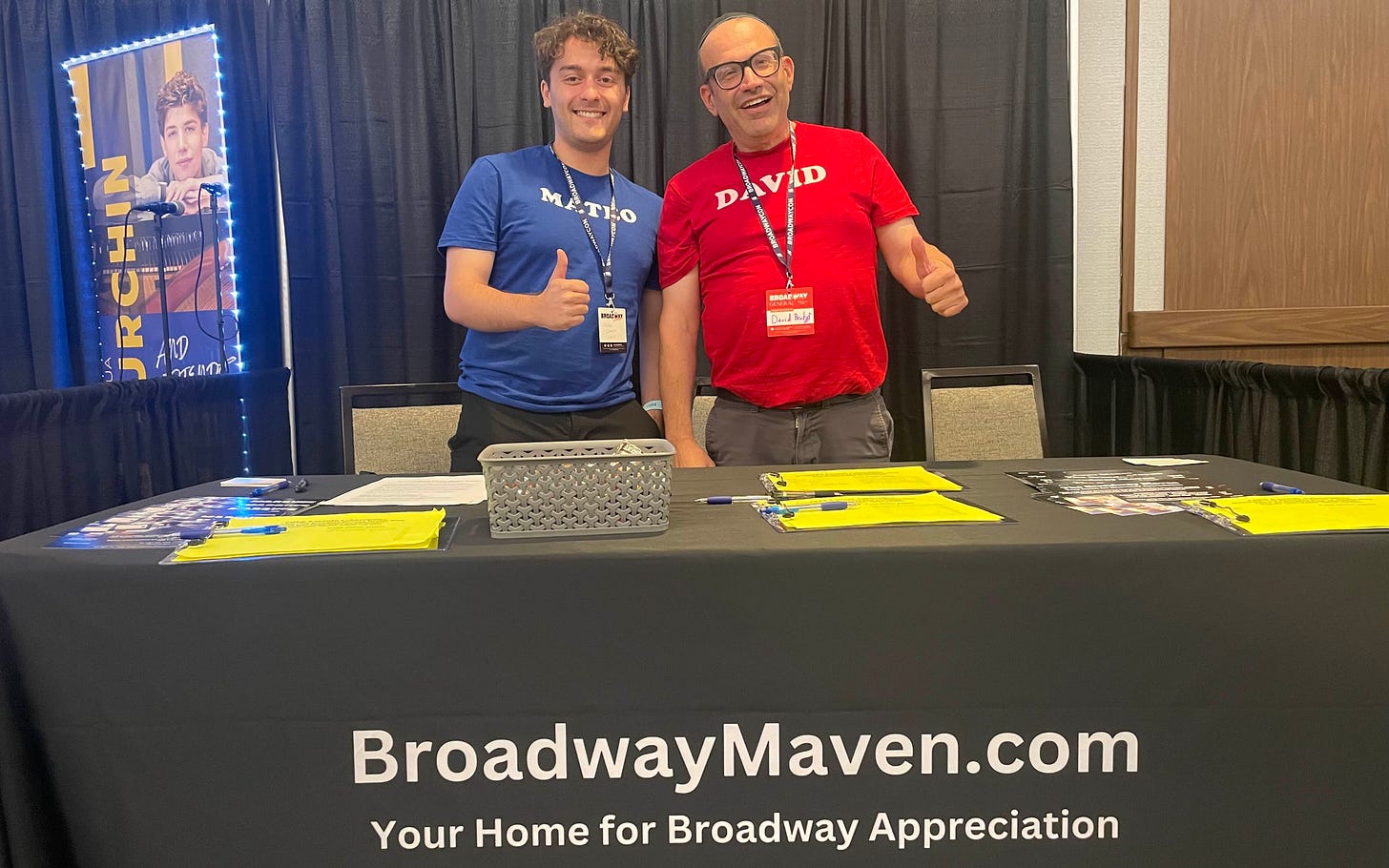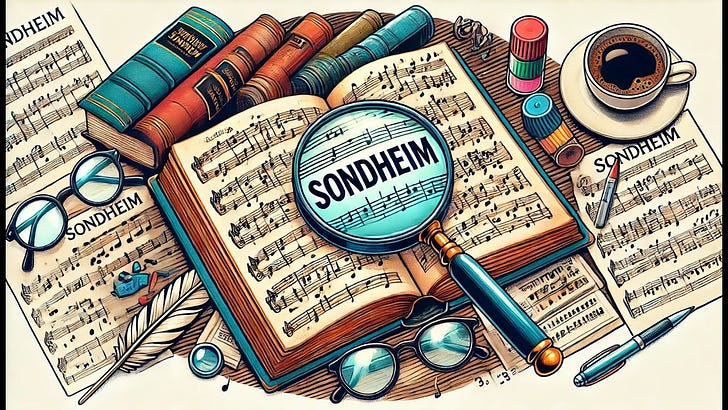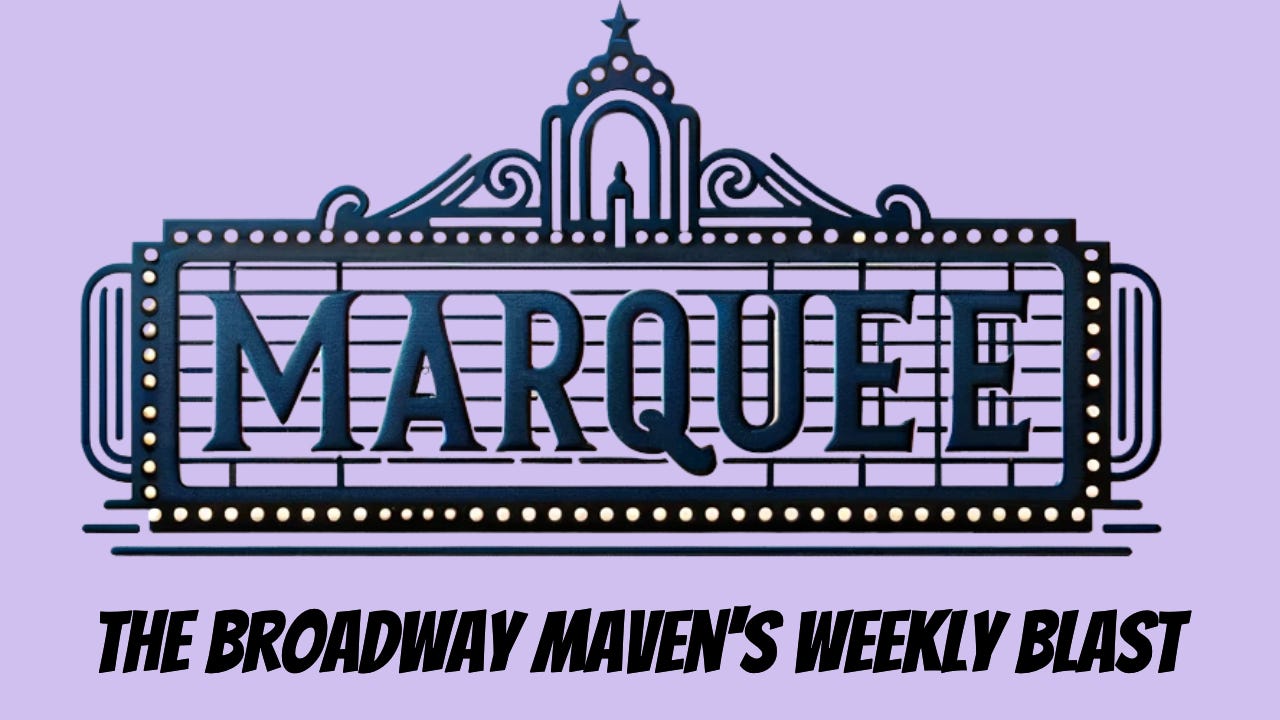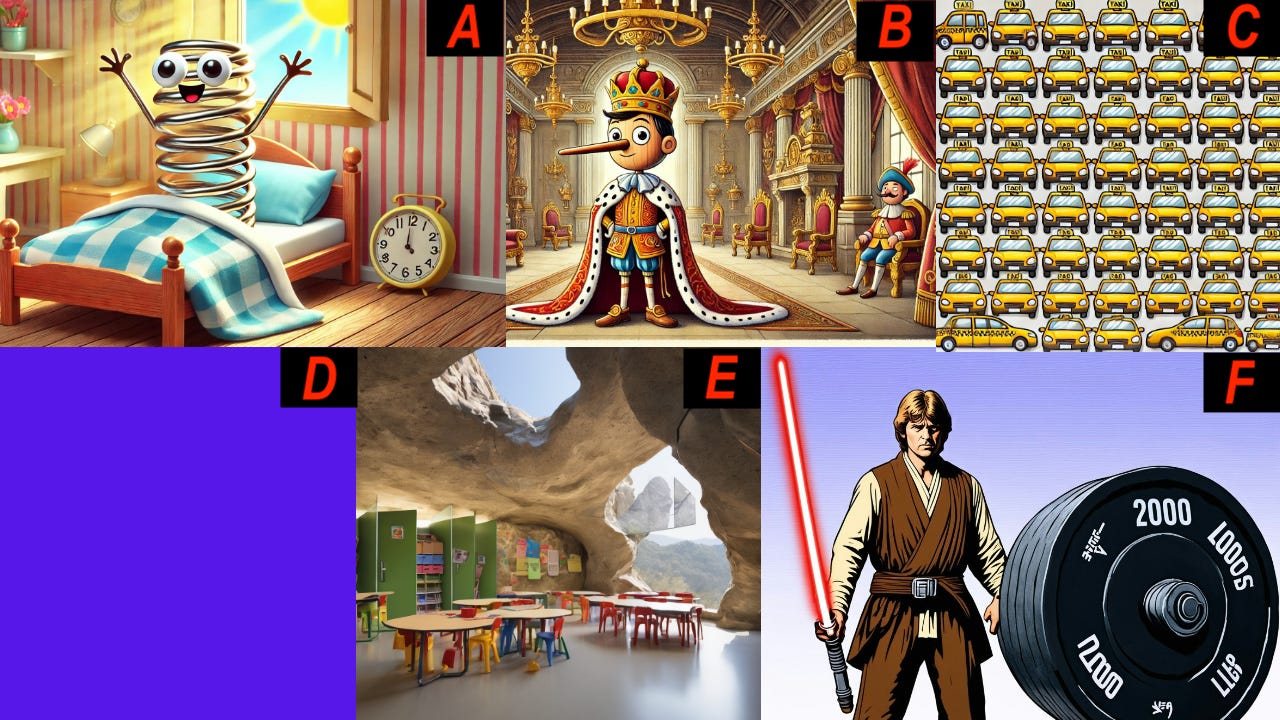🔎 Another Hundred Insights: Sondheim Through a Maven's Lens 🔍
Interpretive video twist on David Benkof's innovative BroadwayCon lecture
Shalom, Broadway lovers!
In today’s monthly FREE Premium edition of MARQUEE: The Broadway Maven’s Weekly Blast: a Broadway Maven YouTube GEM with a variety of insights into Sondheim’s work; a Broadway Blast about Mean Girls; a report from The Broadway Maven’s BroadwayCon booth; a Piano Talk about Passion; a fun rebus puzzle; a homework video for the August 5 class about Oklahoma!; and a Last Blast about Wicked.
AUGUST: FREE four-part Rodgers & Hammerstein course every Monday in August at Noon and 7 pm ET; and a four-part Stephen Schwartz course every Tuesday in August at Noon ET.
NOTE: The calendar for the second semester of 2024 Broadway Maven classes has been announced, and a July-December ALL-ACCESS Pass is now on sale. Get automatic access to 50 classes for just $99. Includes 6 months’ Premium subscription to MARQUEE (a $30 value), access to the archive, two bonus classes only for ALL-ACCESS Passholders, and periodic drawings for off-Broadway and Broadway tickets, including at least one opening night. Classes offered include Rodgers & Hammerstein, Stephen Schwartz, “Sondheim Academy,” Jewish Broadway, Lyrics & Lyricists, and more.
BROADWAY MAVEN YouTube GEM: • Why does Mrs. Lovett from Sweeney Todd use the word "chums" in "By the Sea" instead of friends?
• Why does Madame Rose in Gypsy ask for "88 bucks" instead of another number?
• What work of American literature is alluded to in A Little Night Music?
• How does "Something's Coming" foreshadow Tony's connection with Maria in West Side Story?
• What does "optical art" represent in "The Ladies Who Lunch" from Company?
Dive deep, deep, deep into the world of Stephen Sondheim in this comprehensive video analysis that draws upon my presentation at last weekend's BroadwayCon. Discover dozens of unique insights into Sondheim's unparalleled contributions to Broadway and beyond. From his groundbreaking lyrics to his innovative compositions, this video explores the intricate details of his work that have revolutionized musical storytelling.
BROADWAY BLAST: At its heart, Mean Girls is a show about mathematics. The supposed subplot about Cady and the math contest contains as much thematic material as the tale of the Plastics and the rest of high school society. In fact, the show’s epiphany is disguised as the answer to a math question. When Cady proclaims, “the limit does not exist,” she’s doing far more than answering a calculus question. She’s recognizing and regretting that her involvement with the Plastics is spiraling out of control, and the limit does not exist. Mathematical concepts abound in the show. Damien is too gay to “function” – a calculus term, and Regina George is the “Apex Predator” -- “apex” being a geometry term. And, of course, in the song “Stupid with Love,” Cady sings that while she’s a novice in matters of the heart, “math is real.” That’s all foreshadowing that her social life will become fake, while math will be the field of study that grounds her. In fact, she calls her desire for a fellow student “calculust.” But even before that early song, even before the curtain rises on Mean Girls, savvy audience members know the show involves numbers, since after all, “mean” is a math term.

PIANO TALK: Here, music educator Mateo Chavez Lewis simplifies the score of one of Sondheim's more challenging shows, Passion. He shows how every major musical moment in the entire score is built around two melodies, which are variations of each other.
GAME: A rebus is a word or phrase “painted” with pictures. For example, an image of a clock with a cloth on top would refer to RAGTIME.
Can you correctly identify all six of the Broadway shows represented in the rebus below? Answers after the Last Blast.
HOMEWORK: Rodgers & Hammerstein's Oklahoma! is a landmark musical that revolutionized theater by seamlessly integrating songs with the story. Its themes of community and love on the American frontier remain impactful and relevant. Here's a 10-minute version, just in time for the August 5 FREE class on the musical, which meets at Noon and 7 pm ET. What's the theme of Oklahoma!? Explain your answer in the comments.
Register below for the FREE Oklahoma! class Monday, August 5 at Noon and 7 pm ET; and the Godspell class ($12, or $36 for the series) on Tuesday, August 6 at Noon ET.
Note: Links to register for ALL classes are always available at TheBroadwayMaven.com.
• Monday, August 5 Noon and 7 pm ET Oklahoma! class (FREE)
• Tuesday, August 6 Noon ET Godspell class ($12, or $36 for the series)
• Monday, August 12 Noon and 7 pm ET Carousel class (FREE)
• Tuesday, August 5 Noon ET Pippin class ($12, or $36 for the series)
• Monday, August 19 Noon and 7 pm ET South Pacific class (FREE)
• Tuesday, August 20 Noon ET Wicked class ($12, or $36 for the series)
• Monday, August 26 Noon and 7 pm ET The Sound of Music class (FREE)
• Tuesday, August 27 Noon ET Lesser-known Schwartz class ($12, or $36 for the series)
• Mondays in September: Noon and 7 pm ET Jewish Broadway series
• Tuesdays in September: Noon ET Sondheim Academy Act Three
NOTE: As always, ALL-ACCESS Passholders do not have to sign up or pay for anything. Just show up!
LAST BLAST: Elphaba’s hue in Wicked is a reference to the Wicked Witch of the West’s complexion in the original Wizard of Oz film, of course. But it also works nicely metaphorically. Green represents jealousy, which reflects Elphaba’s attitude toward Galinda’s success in the social and romantic spheres. And it also means “unpolished,” which is perfect for a young woman still learning the ways of sorcery – as well as friendship and love. Green also means “Go,” which is an apt verb for a character known to “close my eyes and leap” into an uncertain future.
SOLUTION TO GAME: A) Spring Awakening; B) The Lion King (lyin' king); C) Cabaret (cab array); D) The Color Purple; E) School of Rock; F) Hamilton (Mark Hamill + 2000 pounds, which is a ton)
Broadway Maven David Benkof helps students further their appreciation of musical theater through his classes, his YouTube channel, and MARQUEE: the Broadway Maven’s Weekly Blast. Contact him at DavidBenkof@gmail.com.









He dis not consider himself Jewish; Jewish tradition has religion being passed from the maternal side
Why should we make a claim from left field that has no validity other than some whimsy which is unrelated to reality
I suppose the question is: "Is being Jewish more like being Catholic or Muslim, or is it more like being Irish, Greek, Italian, Egyptian, or Chinese?" Any and all of those cultural identities can include individuals who subscribe to any religion or none. Is it, therefore, possible to be a Jewish-Baptist or a Jewish-Atheist.? Not being Jewish, I am not qualified to answer those questions.